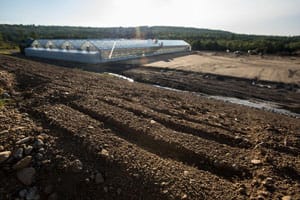With No Soil to Certify, They Can Contaminate the Earth and Sell Faux-ganic Produce to Unsuspecting Consumers
“Organic” hydroponic production is a form of factory farming: the ground is leveled, compacted, and often covered with plastic, while plant roots bathe in synthetic nutrients or are supported by sterile substrates like gravel or coconut coir. The rows and rows of identical indoor plants resemble the worst of livestock production where hens are crammed into battery cages or cattle are packed into barren feed lots—all unable to touch real soil or live natural lives.
 |
Now, the Real Organic Project has brought to light an even more shocking practice in large-scale, “organic” hydroponic production. Glyphosate—the particularly toxic herbicide that is absolutely prohibited on organic farms—is sprayed on fields just prior to constructing hydroponic greenhouses awaiting organic certification. This is done to remove aggressive weeds from the greenhouses.
“It’s vital that consumers understand what is happening here,” said Kestrel Burcham, an attorney and the director of domestic policy for Cornucopia. “If you see cheap ‘organic’ tomatoes or berries out of season in your area, those are almost certainly hydroponically grown! They are often so cheap, they are putting real organic farmers—farmers who care about the health of the land they farm—out of business.”
The National Organic Program (NOP) continues to assert that hydroponic, aquaponic, and aeroponic production is allowed, although these practices appear incompatible with the precepts and even the regulatory basis for organic production. The NOP’s argument in this case seems to be that because the glyphosate does not “touch” the plants being certified, it is all above board—or at least legally defensible.
Cornucopia disagrees. Glyphosate is insidious and can cause contamination in non-target plants via airborne drift and other routes of exposure. In addition, research shows that glyphosate is strongly bound up in soils, and residues pose a risk to subsequent crops. But hydroponic producers seem to have a special license to do many things that are incompatible with organic principles.
Besides the aforementioned glyphosate allowance, they have been given a blanket exemption from the three-year transition period required for all other organic farmers, the time frame during which the land to be certified must be free of prohibited substances, including conventional herbicides. The transition period was put in place, in part, to protect against risks posed by chemical residues like those resulting from glyphosate use.
In addition, these operations appear to have no obligation to soil health: the ground is being compacted and soaked with agrichemicals, destroying the soil microbiome. The plants are then grown in containers filled with inert media. Hydroponic operations are a hindrance to ecosystem services and a violation of the public trust in the organic label.
Helen Kees, organic farmer and Cornucopia’s Board President, observes, “Sustainable and ethical food production is rooted in the soil microbiome. It is the engine of fertility that works in symbiosis with the plants to produce food that nourishes us all. Without this microbiome, there would be no life as we know it on Earth.”
There is a disturbing contrast between tending humus-rich soil, which in turn grows healthy crops, and drenching the ground in toxic herbicides while fertilizing via water piped directly to plant roots. Until the NOP recognizes that soil-less, glyphosate-ridden production isn’t at all organic, it’s up to consumers to seek out authentic, soil-grown produce from real organic farmers.
Read more about these issues in Cornucopia’s Hydroponic Report: Troubling Waters. Our Hydroponic Buyer’s Guide will also help discerning shoppers spot which brands are hydroponically produced.
Read the Real Organic Project’s recent email on the use of glyphosate in “organic” hydroponic production.

